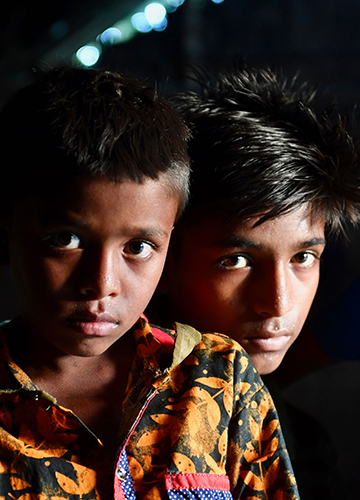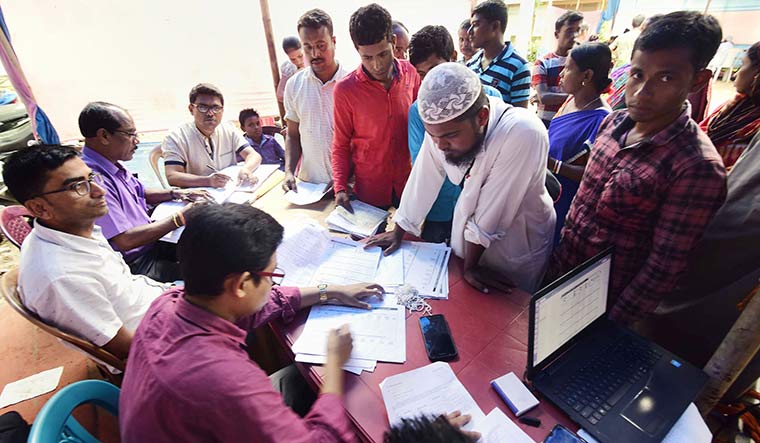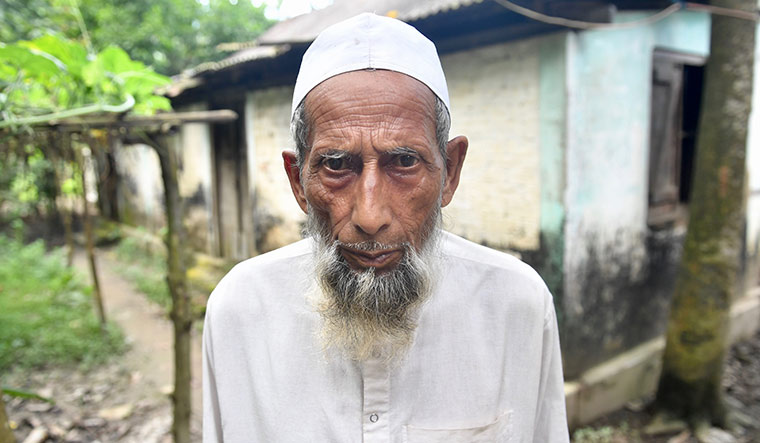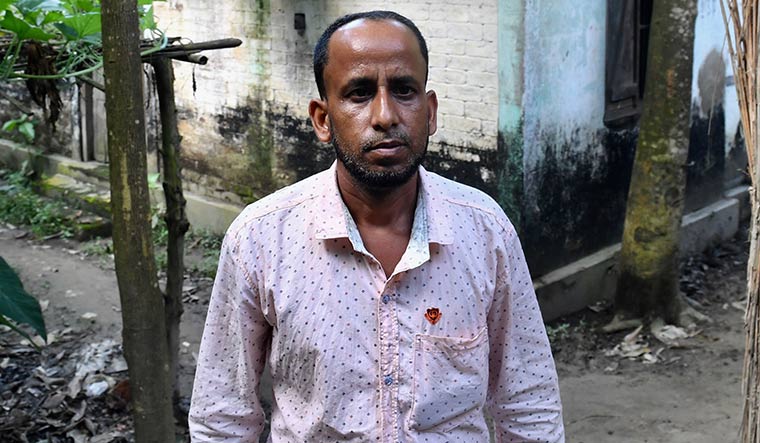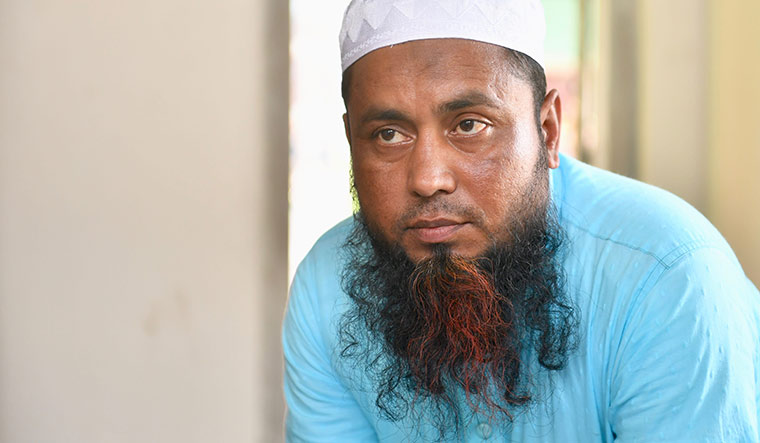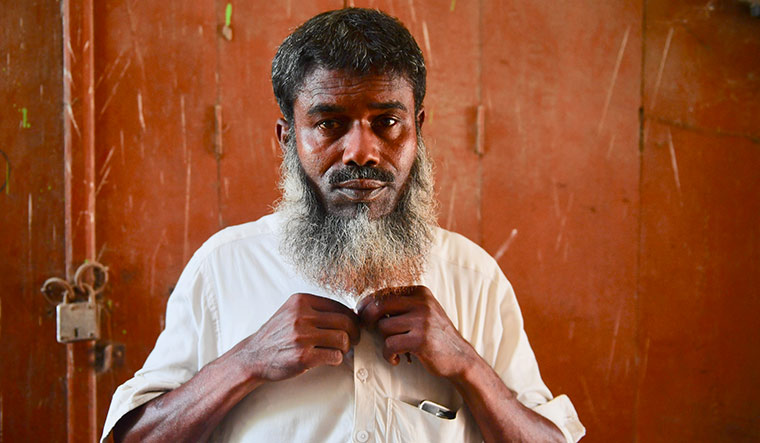Moulavi Muhammad Amiruddin played a pivotal role in putting Assam on the map of independent India. In 1946, the legislative assembly of Assam gathered to discuss whether Assam should be part of India or merge with East Pakistan. Most legislators—34 of 108 legislators were Muslim—wanted to join Pakistan. A few non-Muslim MLAs, too, supported the demand. Sir Syed Muhammad Saadulla, Muslim League leader and the first prime minister of Assam in British India, wanted Assam’s Muslim-dominated regions to be merged with East Pakistan, if a complete merger was not possible.
As the first deputy speaker of the assembly, Muhammad Amiruddin played a key role in foiling Saadulla’s project. A member of the Jamiat Ulema-e-Hind, which opposed the partition of India, Amiruddin was a fiery critic of Muhammad Ali Jinnah, the Muslim League leader who led the Pakistan movement. Amiruddin and Gopinath Bordoloi, Congress leader and chief minister, reached out to all legislators, Muslim and non-Muslims alike, and convinced them to vote for staying in India in a referendum in 1947. Assam became part of the Indian Union after the historic referendum.
Seventy-three years since, Amiruddin’s relatives have been branded as Bangladeshis. Many members of his brother’s family did not figure in last year’s draft of the National Register of Citizens, from which the names of 40 lakh residents were missing. As the foreigners’ tribunal considers their cases, Amiruddin’s relatives are having sleepless nights, fearing that they would be driven out of India after August 31, when the final draft of the NRC is published.
“It is the result day of our lifetime,” said Fakrul Islam Khan of Kalikajari village in Assam’s Morigaon district. “If we pass, we would stay in India. Else, we would be sent to Bangladesh, bag and baggage. What Muslim leaders like Amiruddin did was a mistake. Had they merged us with East Pakistan, we would have been respected citizens of a free, Bengali-speaking nation.”
Fakrul teaches at a school that borders Nagaon district, and he was talking to THE WEEK standing in front of Amiruddin’s house—a tin-roofed hut whose walls were beginning to crumble. Living next door to the hut is Samsul Islam, 70, son of Amiruddin’s elder brother Muzaffar Hossain. Samsul’s two sons, Rafikul and Moijul, have been tagged as Bangladeshis. Moijul’s case is being heard by the foreigners’ tribunal, while its Nagaon bench has already declared Rafikul an illegal immigrant.
Their ordeal has left the family seething. “What are you going to do?” shouted Moijul when I asked him about his case. “You would further complicate the situation and the court would banish us for going to the media. Leave us; we will be deported to Bangladesh soon.”
Surprisingly, Samsul’s name was in the draft list published last year. But, with his two sons in the dock, he fears that he, too, would lose citizenship. Recently, more than one lakh names were dropped from last year’s list, and the persons were given 15 days to prove that they were Indians. Samsul fears that his name figures in the exclusion list. “I am yet to be notified that I have been taken out of the list,” he said.
Samsul remembers the days when the Congress’s national leaders used to visit his uncle’s house. Amiruddin died in 1965 and young Samsul was part of his funeral procession. At least once a year, Congress leader and former Meghalaya chief minister Mukul Sangma calls on Samsul. Amiruddin was Sangma’s maternal grandfather.
“Senior Congressmen like Fakhruddin Ali Ahmed and Rajendra Prasad visited our house and held meetings with Gopinath Bordoloi and my uncle,” said Samsul. “But today, people do not think twice before calling my family Bangladeshi.”
Samsul’s elder son, Rafikul, tried to run when I called on him. As he has officially been declared a foreigner, the border police can arrest him any time. “Just go away,” he shouted. “I am a Bangladeshi. If my statement and picture is published, the police would catch me soon.”
The cases against Samsul’s sons date back to 2003, but they did not expect matters to come to such a head. They had been voting in elections; but now their voter ID is not valid.
Samsul said the border police can tag anyone an illegal immigrant by preparing reports using false witnesses. In Morigaon district alone, around 2,000 people have allegedly been branded as such. “The law of the land does not work here,” said Samsul. “Assam today is not like the rest of India. We talk about Gujarat riots; but has anyone involved in the Nellie massacre been punished? There were 10,000 Muslims who lost their lives in that massacre in 1983. The same way, no one would talk about the labelling of Bengali-speaking Muslims in Assam as Bangladeshis. No investigation is done; no report established with facts.”
Rafikul said his bail application was pending in the High Court. The authorities have warned him that if he talked to journalists about his case, he would be put in detention camp.
Around 20km away from Kalikajari is Borchapori village, where 60-year-old Rahima Khatun is facing deportation. Rahima has not been on the voters list since 1997. A month ago, the local bench of the foreigners’ tribunal summoned her. The tribunal would try to find out whether she entered India before or after March 24, 1971, which is the cutoff date for citizenship claims as per the 1985 Assam Accord.
In the 1990s, the Election Commission began sifting through the voters list to remove non-citizens. The commission appointed election verification officers—mostly state government officials—to authenticate voters across the state. The officers gave a report against Rahima to the electoral registration officer in Assam in 1997, and the ERO told the border police that she could be from Bangladesh. The superintendent of the border police inquired into the matter and submitted a report to the foreigners’ tribunal, after which Rahima was summoned. “You have entered illegally into Assam without any valid documents,” said the notice she received.
Rahima’s father, Abdul Gaffur, was the principal of the first higher secondary school in Morigaon district. He had valid documents, including educational certificates and a ration card for his family, all of which date back to the 1950s. Gaffur died in 2000.
Rahima and her son Faruq, who has also been left out of the NRC list, met THE WEEK in the drawing room of their home. Clad in burqa, gloves and socks, Rahima initially refused to show her face. When Faruq asked her to remove the veil, she revealed her teary eyes. “She was born here, studied here and married in the same village,” he said. “My father is no more and we did not preserve all his documents. It seems now that even a dead man’s records have to be kept safe.”
Rahima said none of her ten siblings are facing deportation. Her brother Baharul Islam is a professor of political science at a famous college in Assam.
She has land records in her father’s name and a certificate from her school showing that she had studied up to Class 8 in the 1960s. But the border police said the documents were “fake” and referred the case to the foreigners’ tribunal.
Even little children have not been spared by the faulty process. At Hatishala village in Kamrup district, farm labourer Syed Ali and his wife found that they were part of the NRC draft, but not their four children. The children—sons Ramjan Ali, Aminul Haque and Abdul Haque, and daughter Sahara Khatun—have been classified as “descendants of persons whose cases are pending in the tribunal”.
“But there is no case against me and my wife,” said Syed, who has travelled to the NRC office in Boko a dozen times in the past year. He has spent Rs24,000 to file objections, and fears that he would have to spend several lakhs before the ordeal is over. “At the NRC office, instead of helping us, the officials took the biometrics of my four children. My fear grew after that. NRC officials are dropping names of citizens and residents of Assam. Our lives are in danger.”
More than 50 people across Assam have committed suicide after being tagged as foreigners. Samiran Nessa, an 18-year-old Arabic student at Hatishala, said she, too, wanted to kill herself five months ago. “We already suffer because we are poor,” she said. “The tag of foreigner is more than what we can bear.”
It was her mother, Basirun Nessa, who talked Samiran out of it. Her father had deserted them to marry another woman. Samiran had been studying on a scholarship, but this time she has not applied for the grant, as she is unsure whether she would be able to stay in India. “NRC officials told me that all my documents are invalid,” she said. “My father does not stay with us and he is not here to defend me. So the officials told me that I would be declared as a foreigner.”
Muslims say the situation in Assam is graver than the one in Rakhine state of Myanmar, where Rohingya Muslims are being persecuted by the government. Mohammad Faysal Haque, who runs a hardware shop in Boko, said the situation could result in an armed rebellion. “It will be worse than Kashmir; it will be worse than Myanmar,” he said. “Don’t forget that in Myanmar, the minority population is just a few lakhs (eight to ten lakhs). But in Assam, there are nearly one crore Bengali-speaking Muslims. All are not Mahatma Gandhi; the hotheaded may strike.”
Faysal said the government and NRC officials are toeing the line of the All Assam Students’ Union. “The AASU has already given a figure—that one crore Bangladeshis are living in India. And the government is acting accordingly,” he said. “All Muslims in Assam want illegal settlers to go. But how can the government put families who have been living here for generations in detention centres? What is happening here is the worst human rights violation in the world.”
All eyes are on the final NRC list that will be published on August 31. “If such a big number of people are asked to leave India or are put in jail, we have no option but to defend ourselves,” said Jaihur Islam of Hatishala. “There is talk about [starting an] armed struggle. Another option is to approach the United Nations.”
Akram Hussein, state coordinator of the Association for Citizen’s Rights, an organisation formed to protect the interests of “NRC victims” in Assam, said they have sought the intervention of Amnesty International. “We have no option but to attract the attention of the entire world,” said Hussein. “Other countries should put pressure on the Indian government.”
There is also a covert campaign to bring together Bengali-speaking Hindus and Muslims who oppose the NRC. The campaign, started by a section of Muslims, is named Cholo Palati (Let’s Change)—a Bengali phrase that helped the BJP end communist rule in Tripura.
“Together, [Bengali-speaking] Hindus and Muslims in Assam outnumber the Assamese,” said Nasiur Rahaman, a trader in Boko. “So we are trying to bring both the communities closer and start a movement. The only problem is that the Hindu community, from which around 10 lakh people have been declared as non-citizens, is busy making a deal with the Indian government.”
But many say the campaign is unrealistic. “Bengali Hindus will never come on board with Muslims,” said lawyer Azad Siddiqui, who is fighting the cases of many people who have been declared foreigners. “Hundreds of crores of rupees have been spent by one community in Assam. Lakhs of poor people are spending money to establish their citizenship. Hindus would not have to fight, because they would get the Citizenship (Amendment) Bill.”
The bill seeks to provide citizenship to those who had been forced to seek shelter in India because of religious persecution in their home countries. Hindus, Sikhs, Jains, Buddhists, Parsis and Christians who entered India from Bangladesh, Pakistan and Afghanistan can apply for citizenship under the proposed law.
The final NRC was to be published on July 31. On July 16, the Union and state governments moved the Supreme Court to extend the deadline set by the court to publish the final NRC. They asked for more time to carry out a “sample re-verification”, which involved verifying the citizenship status of 20 per cent of the population in districts bordering Bangladesh, and 10 per cent of the population in other districts. On July 23, the court extended the deadline by a month, but denied the re-verification request.
The day the Centre approached the Supreme Court seeking an extension, Union Home Minister Amit Shah told the Rajya Sabha that the government wanted to deport illegal immigrants outside Assam as well. “Currently, the NRC is part of the Assam Accord,” he said. “The Centre is dedicated to weaning out illegal immigrants from every inch of this country. We will make sure that all such immigrants are deported as per international law.”
Also read
- NRC suicide: Abhishek Banerjee dares Amit Shah, CEC Gyanesh Kumar to ‘show their certificates’
- Budget 2021: Centre gears up for Census with allocation of Rs 3,768.28 crore
- Those excluded from NRC but on rolls can vote in Assam: EC
- Census postponed due to COVID-19 outbreak
- Census, National Population Register unlikely in 2020
According to an NRC official in Assam, people who are suspected to be foreigners have to provide several documents to prove their citizenship. These include relevant details from the 1951 census and from the voters lists of 1966 and 1971. In the absence of such information, a person has to produce ‘legacy data’, proving that his father, grandfather or great-grandfather had lived in India. “Then there is the requirement of a link certificate from the government to prove that he is part of that family,” said the official. “That could be a birth certificate, school-leaving certificate or a ration card.”
Problems arise when there are discrepancies in the documents. “Either the name of the father is wrong or it does not tally with government documents. Forgery is rampant, because of which even true citizens are harassed, as the tribunal has to go through all the documents,” said the official.
Legal experts say the inhumane attitude of the government is appalling. “The departments related to the NRC process do not have adequate representation of Muslims,” said lawyer Nazrul Islam. “No matter which party is in power—the Congress or the BJP—they never thought of giving proper representation to Muslims in tribunals. Of the 100 foreigners’ tribunal benches in Assam, there is not a single judge who belongs to the Muslim community.”
He said the objective of the NRC process is not to expel Muslims, but to snatch their voting rights. “The aim is to snatch the property and voting rights of Bengali Muslims, who make up 70 per cent of the one crore Muslims in Assam,” said Islam. “Earlier, it was done through violence. This time, the silent atrocity of branding Muslims as foreigners has gone beyond violence.”



